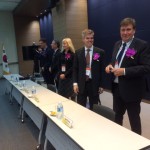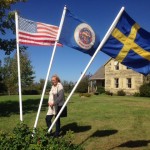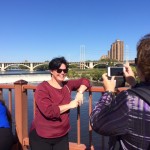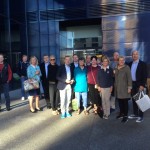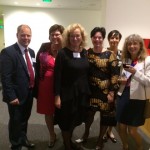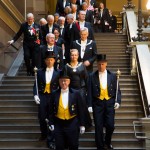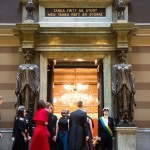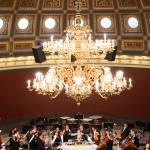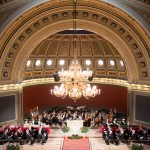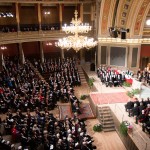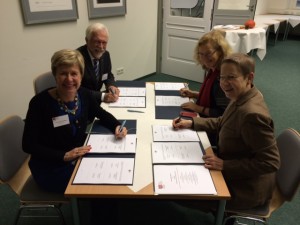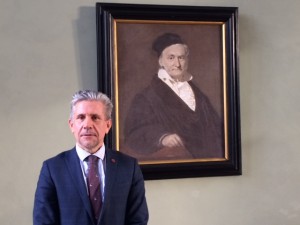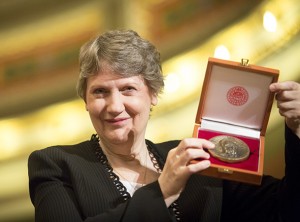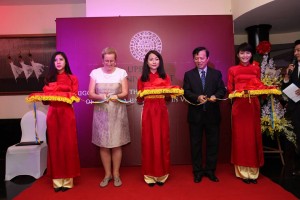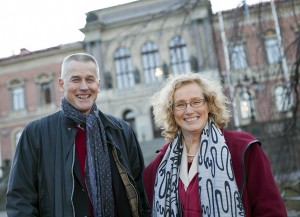
An eventful year is now drawing to a close. The first year for us as Vice-Chancellor and Deputy Vice-Chancellor has entailed new assignments and challenges, but above all an opportunity to get to know you and Uppsala University.
2012 has been a successful year in many ways. Uppsala University is in a phase of triumph and transformation, words we have used in many different contexts. In this last blog entry from us this year, we want to thank you for all of your superb contributions and also to recall and reflect upon the past year. The New Year is an occasion to look both backward and forward.
Emerging strategic priorities
Uppsala University is a broad research university with a strong international reputation. Our mission is to conduct research and education of the highest quality and in various ways to interact with the wider community. Our ultimate goal is – with our research findings, our excellent students, and our outreach collaboration – to help make the world a better place.
In various contexts during the year – primarily, of course, with the vice rectors and students in the Leadership Council – we have pursued discussions about what issues will be especially important for us to continue to work with in coming years in order to reach our ambitious goals regarding research, education, and collaboration. Four prioritized areas have crystalized in these discussions. These are areas where we in many cases are already well poised but where there is reason to step up our efforts even more to advance our positions at departments, faculties, and disciplinary domains – and at Uppsala University as a whole. These four areas are:
Quality and quality work. Uppsala University´s long-term success is entirely dependent on the culture of academic quality that is reproduced and developed in the collegial forums responsible for research and education at departments and faculties. The challenge faced by a broad university in this connection is also to develop work modes where we learn from, are inspired by, and challenge each other across subject, faculty, and domain boundaries in terms of work to enhance the quality of our research and education.
Internationalisation. This is a matter of advancing our positions as a strategy for continuous renewal and development of research and education. As an internationally leading university, we will develop our collaboration and exchanges with leading universities in other countries and offer research and education environments that attract researchers, teachers, postdocs, doctoral students, and students from the entire world.
Ensuring our supply of competence. Perhaps the single most important factor for the University´s ability to fulfil its long-term goals involves how successful we are in recruiting, keeping, and developing qualified teachers and researchers, as well as employees in various support functions.
Infrastructure. Infrastructures for research and education comprise everything from major research facilities to such things as libraries, databases, IT systems, and premises. Housing also comes under this heading. Some of these infrastructures are international, others are national and local, but all of them will require long-term planning and well-considered funding strategies.
The year gone by
Looking back at the year gone by, we can see that these strategic priorities have in many ways already infused our work. One of the year´s major events, the government´s bill on research and innovation, clearly touches on all four issues. Besides raising government research funding and a number of focused research initiatives (national peer review as a basis for allocating government resources), internationalisation, and ensuring our supply of competence (special commitments to attract international elite researchers and to provide leading young researchers with good conditions) as well as infrastructure (investments to expand SciLifeLab, ESS, and MAX IV, all of key importance to Uppsala University).
In terms of education, the year has been dominated by discussions about dimensioning. In various contexts we have pointed out the poor timing of the government´s reduction of educational volumes at Uppsala University. We are being forced to cut the number of students by 10 % over just a couple of years, at the same time as the application pressure for our courses and study programmes is greater than ever. A large and research-intensive university like ours will undoubtedly be able to deal with this adjustment, but it is a pity that we will be forced to close the door to students wishing to pursue study programmes in areas where we have great competence and where society´s needs for a skilled workforce will be growing in years to come.
This mandated volume reduction has also been a reminder of the importance of discussions and planning when it comes to educational strategies. In times of declining volumes, it is especially vital that we pursue a nuanced discussion of how out educational offerings are to be developed. This is not a simple matter, and a number of dimensions need to be factored into the balance: student demand and the needs of the job market must be weighed against where we have competence, quality, and strong research profiles, as well as our identity as a full-scale university. This discussion will undoubtedly have to continue in coming years.
Regarding quality issues the year has been characterized by the National Agency for Higher Education evaluations of study programmes, KrUUt (Creative Developmental Work at UU), and ranking questions.
The evaluations by the National Agency for Higher Education have attracted a great deal of attention. The method has been heatedly discussed and questioned on many points. These evaluations have major consequences, with winners and losers, redistribution of resources, or withdrawn accreditation to issue degrees. Uppsala University has had a number of programmes called into question, which is something we cannot be happy about. At the same time we have been awarded top grades for many of our major programmes, which rendered us winners in the first year of allocation of extra quality funding. When it comes to the points where we were criticized, the evaluations have also led to intensified work to remedy deficiencies and develop forms of teaching, which is good.
The so-called KrUUt project is spurting down the home stretch. Activities that have been carried out within faculties and domains have submitted their reports and reviewed by an international panel whose conclusions and recommendations will be accounted for in the final report early in the new year.
University rankings are attracting ever-greater attention, whether we like them or not. In 2012 we at Uppsala University have been actively working to develop an approach to the phenomenon, which also includes a selection of which ranking lists are interesting to monitor. The outcomes of the major rankings in 2012 evince only minor changes compared with the previous year. With one exception, we have maintained our position as one of the world´s 100 foremost universities:
- Shanghai ranking (AWRU) 73
- QS World University Rankings 81
- Times Higher Education 106
- National Taiwan University Ranking 88
In December the Swedish Riksdag reached a decision entailing that operations at Gotland University College will become part of Uppsala University as of 1 July 2013. The point of departure for the multiyear integration process that led to this decision is closely linked to quality. By becoming a part of Uppsala University, operations in Visby will be better equipped to become a setting for full-fledged academic research and education of the highest quality. But the merger brings more benefits than that. Campus Gotland will in many ways contribute to the diversity and advancement of Uppsala University, with among other things liberal arts courses and study programmes and Net-based instruction.
Internationalisation work is being conducted on many fronts. We have a steady flow of international visitors coming to Uppsala to learn about our operations and forge contacts for future exchanges: ambassadors, politicians, and not least vice-chancellors from other universities. During the year we have received visitors from Brazil, Bulgaria, Chile, China, France, Lithuania, Malaysia, Portugal, Rwanda, and Uganda, to name just a few examples. Of course, Uppsala University has also hosted a large number of international conferences. It is good that so meetings of different sorts bring people from all over the world to visit us. Plans to establish a global meeting place in the field of health, ethics, and economics are continuing. In this a number of actors in the city are collaborating to create an Uppsala Health Summit.
Uppsala University participates in several different networks and associations of higher-education institutions from various countries.
We have taken part in meetings with our partners in the European University Centre at Peking University, U4, and Matariki. We are now planning coming visits to universities that we wish to learn from and/or strengthen our relations with. Next in line are Århus, Cambridge, Edinburgh, and University College London.
In the past year we have also had occasion to celebrate major advances made by Uppsala University within Erasmus Mundus. We are now involved in as many as ten programmes, one of which we are coordinating ourselves. This is a good level. We should perhaps not try to do more but instead give priority to other regions, partners, and preferably coordinate a programme geared to southern Africa within SANORD.
Matters involving our supply of competence have also been central. We continue to recruit new associates at a rapid pace. We wish to extend a cordial welcome to all of the several hundred individuals who embarked upon their employment at Uppsala University during 2012! If we haven´t met yet, we look forward to meeting you at the next introductory day for new employees.
Our doctoral conferment ceremonies and inaugurations of professors are also powerful manifestations of our supply of competence. Of the 42 professors installed in November, 40 % are women, evidence that we are approaching a better balance also at this level. One thing we are extremely proud of is that we, as the first higher-education institution in the country, have put in place forms of employment enabling younger researchers to enhance their qualifications. As of November it is possible recruit assistant university lecturers and research assistants at Uppsala University, an opportunity that we hope will be put to extensive use of in 2013.
Infrastructure issues have occupied us a great deal. The single most important question has been to put in place the structure for SciLifeLab. This is a unique initiative in Sweden, where Uppsala University, together with universities in Stockholm, is now to create a national research infrastructure, Sweden SciLife. This is a major governmental commitment, a fantastic opportunity, and a daunting responsibility. At the Biomedical Centre, BMC, the so-called Hub is now under construction, as a meeting place in Uppsala for this initiative. Ground has also been broken for the so-called Freia Hall, where Uppsala University is to develop and construct accelerators and instruments for ESS in Scania, in southern Sweden.
Together with Akademiska hus we are planning new construction. The project to build a new administration building in the Nursery has sparked considerable debate, and this will no doubt continue to be discussed in coming years, as the planning process continues. The municipality is working hard, and ever more successfully, to address the housing issue, which is important for both students and new employees.
The serious incident that caused disruptions in the IT system for a couple of days in late May was a reminder of the importance of continuously developing hardware, software, and organization for this crucial infrastructure.
+ + +
And of course there are lots of fun and exciting things that happen at a large and broad university during a year.
We are working constantly to develop and deepen our relations to organizations and individuals who wish us well in various ways and want to support our operations. We continuously invite representatives from research financiers, business, and public authorities to visit us. The grants we receive from councils and foundations – all of them – are absolutely critical to how our research is able to advance. We are working ever more systematically with our alumni network. We benefit greatly from Uppsala universitets vänner, as well as the US-based foundation American Friends of Uppsala University. The University Board, led by its chairman, Hans Dahlborg, puts in a tremendous amount of work and engagement to help us move forward.
A number of annual lectures provide us with opportunities to invite world-leading researchers to Uppsala. Conferment ceremonies, inaugurations of professors, diploma ceremonies, banquets in honour of recent retirees, the Anders Wall lecture and Entrepreneurship Day, the November Fest, and the visits from the Nobel laureates in December are obvious highlights of the academic year in Uppsala. Our successful unit for innovation and collaboration, UU Innovation, garnered well-deserved acclaim on its fifth anniversary in September.
As leaders of a large and broad university with a decentralized organization, it is particularly challenging for us to develop channels for communication and exchange of information. Blogs, Facebook, and Twitter are all fine, but the visits we make to disciplinary domains and departments are, like our Senate meetings, unsurpassed when it comes to both getting a sense of the challenges and problems that occupy our operations and having a chance to discuss various strategic considerations and policies. During the year we have begun to develop forms of dialogue with the disciplinary domains. This spring the focus will be on the budget, and in the autumn it will be on quality and strategic challenges. We will continue to pay visits to departments in 2013. We will also be trying out pan-University seminars on topical issues, under the aegis of the newly established Quality Council.
Looking ahead
2013 will bring new challenges. Nothing seems to indicate that there will be less to do. We have research and education of the very highest quality, but we cannot rest on our laurels. The outside world is in flux, and the competition is stiffening. Securely anchored in our fundamental values and firm in our convictions about what our mission is, we stand ready to accept future challenges.
We do so together with representatives of our collegial bodies, and with you students, teachers, researchers, and other employees, along with all other friends and champions of Uppsala University. Together, we are – and are developing – Uppsala University.
Eva Åkesson and Anders Malmberg

